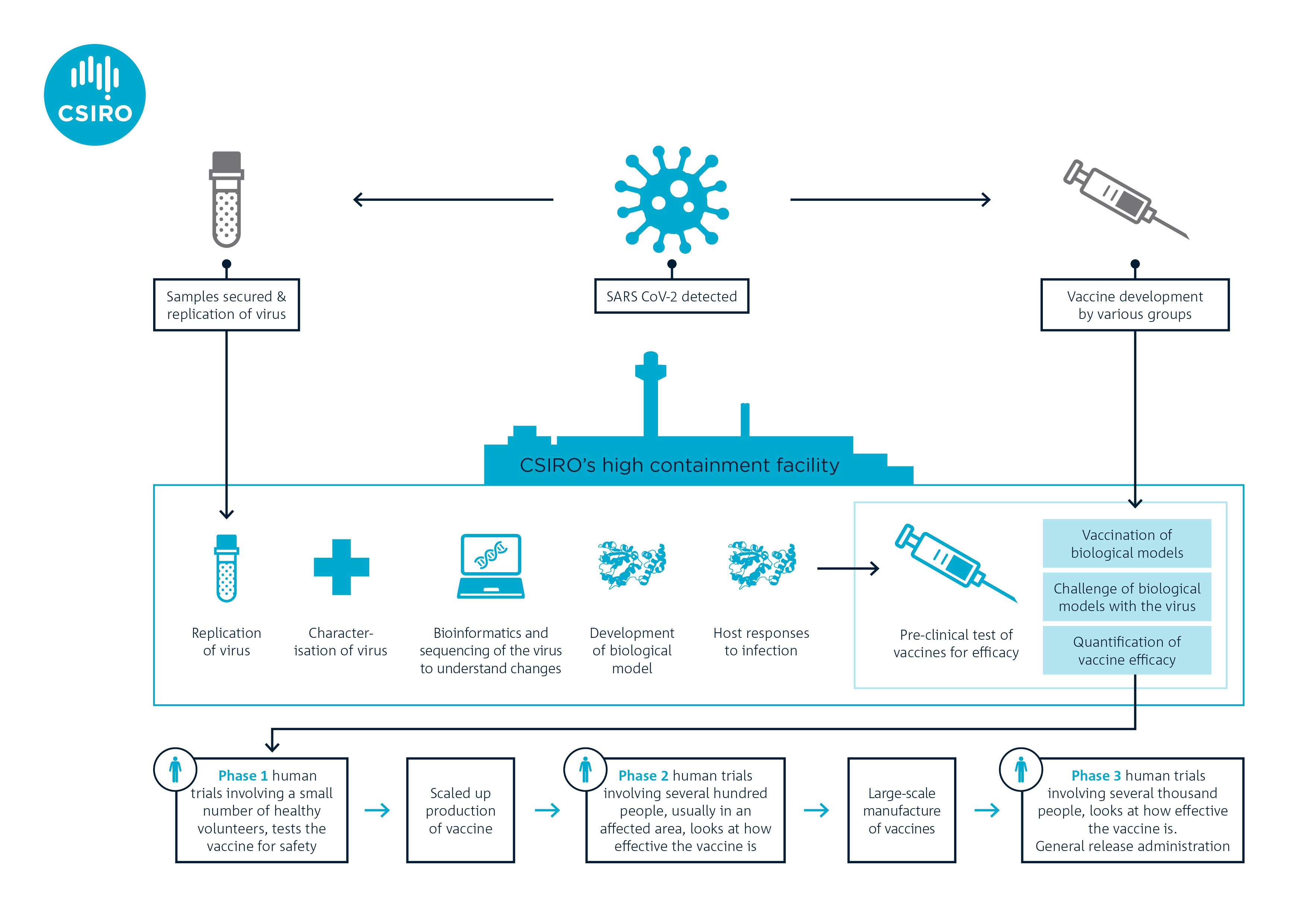The Coalition for Epidemic Preparedness Innovations (CEPI), a global group that aims to derail epidemics by speeding up the development of vaccines, engaged us in January 2020 to start critical new research on SARS-CoV-2, the virus that causes COVID-19. In consultation with the World Health Organisation, CEPI selected two vaccine candidates from the University of Oxford (UK) and Inovio Pharmaceuticals Inc (US) for testing at the Australian Centre for Disease Preparedness, our high-containment biosecurity facility in Geelong.
Our Dangerous Pathogens Team worked with the first strain of SARS-CoV-2 isolated outside of China by the Peter Doherty Institute. Our researchers were the first to grow sufficient stocks to investigate the physical and molecular characteristics of the virus to find differences and similarities with other known coronaviruses.

The team was also the first in the world to show that ferrets are susceptible to the virus, and developed an animal model to initiate the world's first multi-vaccine efficacy studies.
Preclinical evaluation of potential COVID-19 vaccines
Preclinical trials commenced in late March 2020 for Inovio Pharmaceuticals' DNA vaccine, and the University of Oxford's adenoviral vectored vaccine.
The preclinical trials involved testing the COVID-19 vaccine candidates for efficacy and also evaluating the best way to give the vaccine for better protection. The team evaluated the advantages of administering Oxford's vaccine intranasally versus an intramuscular injection.
Data from these trials was shared with CEPI, The University of Oxford and Inovio Pharmaceuticals. The results from these trials went through internal and external review, quality assurance and a compliance audit. This was all part of the process of rigorously determining the safety and effectiveness of the vaccine candidate to the standard required by licensing authorities. The results were published following this review.
In addition to vaccine evaluation, this team also worked with bioinformaticians from our Australian e-Health Research Centre to assess if mutations in the virus affected the animal model or vaccine candidates.
The Coalition for Epidemic Preparedness Innovations (CEPI), a global group that aims to derail epidemics by speeding up the development of vaccines, engaged us in January 2020 to start critical new research on SARS-CoV-2, the virus that causes COVID-19. In consultation with the World Health Organisation, CEPI selected two vaccine candidates from the University of Oxford (UK) and Inovio Pharmaceuticals Inc (US) for testing at the Australian Centre for Disease Preparedness, our high-containment biosecurity facility in Geelong.
Our Dangerous Pathogens Team worked with the first strain of SARS-CoV-2 isolated outside of China by the Peter Doherty Institute. Our researchers were the first to grow sufficient stocks to investigate the physical and molecular characteristics of the virus to find differences and similarities with other known coronaviruses.
The team was also the first in the world to show that ferrets are susceptible to the virus, and developed an animal model to initiate the world's first multi-vaccine efficacy studies.
Preclinical evaluation of potential COVID-19 vaccines
Preclinical trials commenced in late March 2020 for Inovio Pharmaceuticals' DNA vaccine, and the University of Oxford's adenoviral vectored vaccine.
The preclinical trials involved testing the COVID-19 vaccine candidates for efficacy and also evaluating the best way to give the vaccine for better protection. The team evaluated the advantages of administering Oxford's vaccine intranasally versus an intramuscular injection.
Data from these trials was shared with CEPI, The University of Oxford and Inovio Pharmaceuticals. The results from these trials went through internal and external review, quality assurance and a compliance audit. This was all part of the process of rigorously determining the safety and effectiveness of the vaccine candidate to the standard required by licensing authorities. The results were published following this review.
In addition to vaccine evaluation, this team also worked with bioinformaticians from our Australian e-Health Research Centre to assess if mutations in the virus affected the animal model or vaccine candidates.
